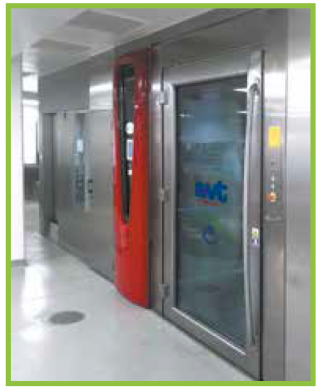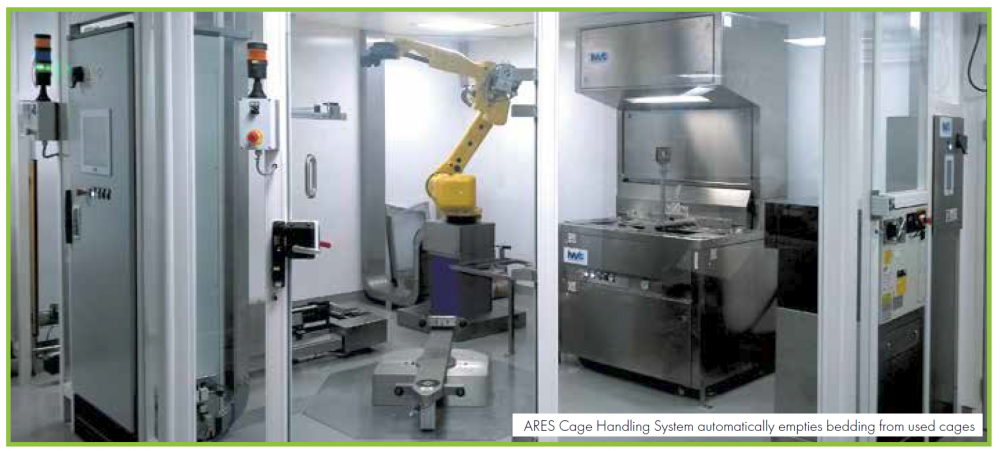

In summer 2018, the CBS facility at the South Kensington Campus reopened following a year-long refurbishment. The project has been carefully planned to meet the needs of researchers and technicians working with animals at South Kensington, creating flexible workspaces and improving the efficiency of day to day processes. CBS Deputy Director and Site Manager, Wendy Steel, explains what’s changed. “The facility is over 20 years old. It had been in need of refurbishment for a few years, so we’re very happy that the College decided to invest in it,” says Wendy. “The main problem we had was that some of the machinery was reaching the end of its lifespan. The air handling unit – which is really important to maintain the environment for the animals – was old and parts needed replacing. To remain compliant with the Home Office’s guidelines, we had to refurbish the facility, otherwise we would eventually have had to close it.”
During the works, the animals were moved to alternative facilities on the Hammersmith and St Mary’s campuses, although some remained at South Kensington. “There’s a lot of work on site that couldn’t be moved to either Hammersmith or St Mary’s,” explains Wendy. “We had around 700 cages still on the South Kensington Campus, so we’ve still been quite busy while the main unit has been closed.”
The refurbishment has enabled the CBS team to rethink the space and the experience of the staff and animals who spend time in the facility. Access routes throughout the facility have been replanned to improve efficiency. Larger changing areas and meeting spaces for staff have been created. Even the colour scheme and the lighting has been updated to better support the well-being of animals and the staff working with them. However, one of the most radical changes has been the installation of three new machines which will automate the majority of work involved in cleaning animals’ cages and water bottles.

The new machines divide the cleaning area in two, creating a ‘clean’ and dirty’ side. Used cages and water bottles come in on the dirty side where they are emptied, cleaned and refilled, before they emerge on the clean side ready to use.
The cage handling machine – able to handle up to 3,000 cages each week – is equipped with a robotic arm that can pick cages up and scrape soiled bedding into a waste bin. All of the waste that goes into the bin is macerated and then extracted by vacuum, where it is directly transferred to a clinical waste compound outside the building. The empty cages are then transferred to a rack washer for cleaning, before moving to the clean side of the facility to be refilled with bedding or sterilised.
Used water bottles are brought into the cleaning area on crates, ready to be loaded onto the bottle washing machine’s conveyor belt. The machine automatically removes the bottles’ caps, before they are emptied, washed and rinsed. The bottles then move through the machine to the clean side of the room where they are filled with fresh, sterilised water. New clean caps are put back on to the bottles inside the machine and they come out at the other end of the machine in crates ready for use.
The refurbished cleaning area will bring huge benefits to the CBS team working in the facility, as Wendy explains, “Although previously a machine was used to wash the cages, each one had to scraped by hand to remove soiled bedding and the waste material was removed from the facility manually. The new automated system improves manual handling and makes things more hygienic.” New animal holding areas and procedure suites, equipped with state-of-the-art machinery, have been created as part of the works, and the facility now also includes an area where animals who have been used in research elsewhere on the South Kensington Campus can be kept separately from other animals already housed in the facility. This area includes a holding and procedure suite, as well a room where equipment can be sterilised using vaporised hydrogen peroxide before it enters the main unit.
The facility’s improved flexibility also means that the CBS team can reduce the number of animal research operations at South Kensington that are housed outside the facility. Wendy explains, “Some of the specialised equipment, such as that used by the Department of Bioengineering, has to be kept outside of CBS – we can’t bring it in here. So, there’ll always be a need to have some animals outside CBS at South Kensington. But with the refurbishment, we’ve been able to reduce that as much as we can."
“There are some operations that were housed outside just because we didn’t have the room, but because now we have a more flexible space, we’ll be able to bring some of that work in. This is better for everyone: better for the animals and better for the people working with them. From a 3Rs perspective, we definitely see that as a refinement.”